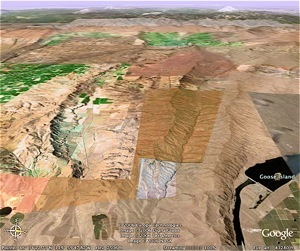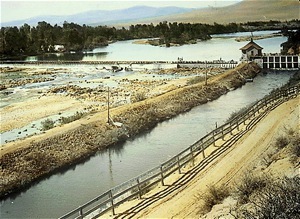Black Rock Follies
Prepared by Rachael Paschal Osborn
Black Rock Follies
Prepared by Rachael Paschal Osborn

Introduction
A proposal for a water supply reservoir in the Black Rock Valley, east of the city of Yakima, has been kicking around for years. It got legs in 2003 when the Yakima Basin Storage Alliance, a local booster group, successfully lobbied to fund a U.S. Bureau of Reclamation study of the Black Rock damsite. That study, Yakima River Basin Water Storage Feasibility Study, has expanded to evaluate several additional reservoir sites and water supply options in the Yakima River basin.
This website examines the many flaws of the Black Rock dam & reservoir proposal.
Hot News:
Black Rock is a Losing Proposition . . .
On November 30, 2006, the U.S. Bureau of Reclamation issued a “Plan Formulation Report” that includes a detailed cost-benefit analysis for Black Rock and another dam proposal, Wymer Dam and Pump Exchange.
The Bureau finds that the Black Rock cost-benefit ratio returns 16 cents on the dollar. Wymer pencils out even worse, at 5 cents on the dollar.
As the Bureau succinctly states: “The alternatives are not economically justified.” (Nov. 2006 Plan Formulation Report, p. 66. Click here to download report.)
. . . But the State and Bureau Will Go Forward
Under federal law, the Bureau may not build a project that does not have at least a break even (1:1) ratio of costs and benefits. Unfortunately, Washington State has no similar requirement.
As the Bureau’s own numbers show, at a 16:100 ratio, Black Rock does not even come close to the economic break-even point. Nonetheless, the Bureau and the Department of Ecology announced that they intend to begin environmental analysis for the Black Rock project in January 2007.
Why would the Bureau of Reclamation and the State of Washington spend taxpayer dollars studying a project that is an economic loser and cannot be built? There are several likely reasons:
•Naked water politics. In Yakima, agriculture is king and the agencies who serve water to that king are not willing to tell him that he is wearing no clothes. New water to fill new reservoirs is not available in the Yakima or the Columbia Rivers. Further, the value of agricultural crops in the Yakima does not support new water projects. The $4 Billion Black Rock project would yield only $4 million per year in new agricultural receipts. Even after 100 years, agriculture would amount to just one-tenth of what it would cost to build Black Rock.
•Pork and water do mix. Washingtonians are entering a new era of pork barrel water projects. Politicians dream about magnificent sums that could enter local economies if they could just figure out how to build a shiny new dam. Unfortunately their dreams are just that. A recent WSU study predicts that future agricultural development in eastern Washington will be flat and there will be little if any demand for new water supplies.
•More pork – project development. Even before construction is contemplated, the study of new dams requires tens of millions of dollars, which support agency budgets and get doled out to private consulting firms. Agencies and consultants lobby heavily for dam projects. At least 4 studies of new dams are underway in the Washington portion of the Columbia watershed. These studies are feeding a new dam-building industry.
•The Trojan Fish. Because dams have effectively destroyed the salmon-based ecosystem of the Pacific Northwest, new dams are sold as “fish-friendly.” Virtually all pending dam proposals claim that a primary benefit of the project is to provide water for fish (and sometimes this is true). Ironically, the same agencies and private parties that are so anxious to build dams for fish tend to do little for fish in other contexts, including protecting and restoring natural flows in rivers. Many fishery problems could be fixed with a fraction of the budget that is needed to build new dams.
Black Rock is a losing proposition. The State of Washington and the U.S. Government are throwing good money after bad as they continue to study and promote the Black Rock dam.
Next: History of Over-Appropriation in the Yakima River Basin


Proposed Black Rock Reservoir


Black Rock Reservoir site Columbia River



Roza Diversion, Yakima River with irrigation ditch leading from dam.
John Osborn photo
To enlarge map, click here.

Columbia Institute for Water Policy
Black Rock Follies © 2007
















